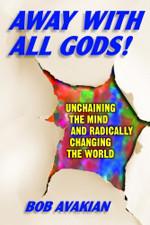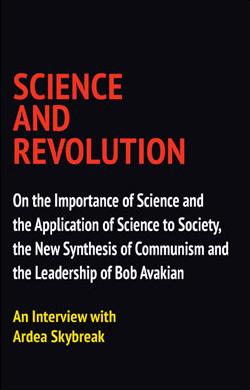

Away With All Gods! Unchaining the Mind and Radically Changing the World by Bob Avakian
Available in eBook, paperback, and hardcover through Insight Press, your favorite bookstore, or online retailer (Amazon, Barnes & Noble, etc.).
Published by Insight Press
4044 N. Lincoln Ave., #264
Chicago, IL 60618
(773) 329-1699
Here it is important to answer the argument that is not infrequently made—including by people whose stance is to oppose religion in general—that while all religious fundamentalism is bad and harmful, there is something particularly evil and dangerous about Islamic fundamentalism. This, for example, is the position of Sam Harris, author of The End of Faith: Religion, Terror and the Future of Reason and Letter to a Christian Nation; and it is the stand rather obviously and quite aggressively insisted on by Christopher Hitchens, whose recent book, and in a concentrated way its title, God Is Not Great: How Religion Poisons Everything, encapsulates the contradiction I am speaking to here. On the one hand, as expressed in the secondary part of the title, Hitchens' book is a broadside against religion in general; but the first, and main, part of the title involves—and is no doubt meant to involve—a very definite salvo directed against Islam in particular: it is a "negative echo," so to speak, of the common Islamic invocation: God is Great. It is not hard to see how this position dovetails rather neatly with that of the Bush regime and the U.S. imperialists in general with their "war on terror" and its declared target of "Islamic extremists."
To begin with, from what has been shown so far, it should be very clear that, with regard to the scriptures and the religious tradition of Christianity there is no basis for arguing that it is, in any fundamental or essential sense, different from or better than Islam. Any attempt to take this up and apply it—and still more to impose and enforce it—in a literalist sense, insisting that it is the "inerrant word of God" which must be followed to the letter, as the Christian fundamentalists do, can indeed only lead to horrors of the greatest magnitude. Once more, all this is something which humanity needs to move beyond and forever leave behind.
Click here for more about and by
Bob Avakian
Perhaps in recognition of the reality that there is nothing to choose between Islamic fundamentalism and Christian fundamentalism, as such and on the level of the literal word, a common component of the position that somehow Islamic fundamentalism is worse than fundamentalist Christianity is the argument that, yes, the latter may be just as awful in its content, but particularly in a country like the U.S.—where it is increasingly hard to ignore or deny that Christian fundamentalism is a major phenomenon—the effect it can have and the danger it poses is restrained and mitigated by the fact that one of the pillars of Constitutional government in this country is the separation of church and state. Well, first of all, that separation, while real, has always been anything but absolute; and, moreover, it is a separation that is under concerted attack by the Christian fundamentalists and powerful forces in the ruling class representing, or allied with, these fundamentalists (while the sections of the ruling class that are not themselves advocates of this religious fundamentalism are at great pains to compromise and conciliate with it and to promote religion in public life—witness, as just one example, the repeated professions of profound religious faith on the part of every major candidate for the Democratic Party presidential nomination). The danger posed by theocratic Christian Fascists—and the lack of any real ruling class opposition to this—is very real. And this assault on the separation of church and state has not at all been rendered toothless, or strategically weakened, by the fact that Bush has become an extremely unpopular president.1
Generally speaking (although not uniformly so) it is true that in the parts of the world where Islam is the dominant religion, there has not been the same phenomenon of a bourgeois-democratic transformation of society that has occurred in countries like the U.S., in which one of the main aspects of that transformation has been a (relative) separation of church and state. The prevailing, and institutionalized, doctrine and tenets of Islam reject a separation between religion, on the one hand, and politics and the law, on the other hand, as well as between religion and what is generally referred to as "civil society". But that has been true of Christianity, and the states where Christianity has been the dominant religion, for most of their history—and it is only a relatively recent period, historically speaking, that has seen a change in this, through the kind of bourgeois-democratic transformation to which I have referred. And it is important to recognize that, as a rule, it is those countries which have undergone such a bourgeois-democratic transformation, as part of the emergence and triumph of the capitalist system, which have developed into imperialist powers, and whose imperialist conquest and domination of countries throughout the Third World, including those where Islam is the dominant religion, has been a major factor in obstructing, in those countries, the kind of transformation that would involve the separation of church and state. The relative "backwardness" of those Third World countries has repeatedly been invoked as justification for colonialism and imperialist conquest. And, in turn, this imperialist conquest and exploitation, with all the consequences it has led to, including the installing and backing of corrupt and tyrannical "local governments" and the devastation of much of the way of life and the living conditions of the large majority of the population, has actually strengthened tendencies which identify ideas associated with "the West"—such as the progressive aspects of the Enlightenment, with its spur to critical thinking, its challenging of religious dogma, and its contribution to the separation of politics from official religion—as alien and antagonistic to the needs of the people.
This speaks to the argument that is also frequently raised that, even if it is true that the ideas embodied in Christian fundamentalism are every bit as bad as those of Islamic fundamentalism, there is a great difference in that Christian fundamentalists do not go around blowing up people and buildings and generally engaging in terrorist activity, while such activity is common among Islamic fundamentalists. Besides the fact that Christian fundamentalists have indeed engaged in acts of terror, including within the U.S.—such as the bombing of clinics where abortions are performed and the murder of doctors who perform abortions—and that Christian fundamentalist forces are being "primed" to carry out reactionary violence on a much greater scale, should that be deemed necessary by those for whom they are in fact being readied as shock and storm troops—there is the reality that, up to this point, violence which serves ends that are passionately supported by the Christian Fascist fundamentalists has been carried out on a massive scale by the imperialist ruling class of the U.S., utilizing the armed forces and police of the imperialist state—with more of that violence currently being threatened (such as an attack on Iran, in addition to the wars presently being waged in Iraq and Afghanistan). And one of the distinguishing features of those armed forces in this period is precisely that they are being increasingly influenced by, and even indoctrinated with, a fundamentalist Christian Fascist outlook, from the top levels of the military on down.2 Therefore, up until now at least, there has not been a need or compulsion among Christian Fascist fundamentalists to engage in terrorist activity and reactionary violence on a large scale, separately from the "official" armed forces and police of the ruling class—although, again, it has certainly been carried out by Christian Fascists on a smaller scale and there is definitely the potential for this to be carried out on a much wider scale.
All this, once again, is a reflection of the "lopsided" relations of a world which is dominated by a handful of imperialist countries, and one imperialist superpower in particular at this time, while the great majority of countries, and of people, in the world, and particularly in the Third World, endure extreme conditions of poverty, exploitation, massive dislocation and upheaval—all enforced on the basis of imperialist rule.
In today's world, a particular expression of these contradictions is the mutually reinforcing opposition between imperialist globalization and its effects, on the one hand, and Jihadist Islamic fundamentalism on the other hand. Utilizing a phrase (actually a book title) from Benjamin R. Barber, who refers to the phenomenon of "Jihad vs. McWorld," and expanding on this to include the element in which Christian Fascist fundamentalism is in fact a significant element within the prevailing program and ideology of the imperialist ruling class of the U.S., I have put it this way:
What we see in contention here with Jihad on the one hand and McWorld/McCrusade on the other hand, are historically outmoded strata among colonized and oppressed humanity up against historically outmoded ruling strata of the imperialist system. These two reactionary poles reinforce each other, even while opposing each other. If you side with either of these 'outmodeds,' you ended up strengthening both.
This speaks precisely to what is wrong with the position that somehow Islamic fundamentalism is worse than Christian Fundamentalism and to how that position lends support to the "historically outmoded ruling class of the imperialist system." And, as I have also emphasized in relation to these "two outmodeds":
it is important to be clear about which has done and continues to do the greater damage, which has posed and does pose the greater threat to humanity. Clearly, and by far, it is "the ruling strata of the imperialist system."
It is interesting, I recently heard about a comment that someone made relating to this, which I do think is correct and getting at something important. In relation to these "two historically outmodeds," they made the point: "You could say that the Islamic fundamentalist forces in the world would be largely dormant if it weren't for what the U.S. and its allies have done and are doing in the world—but you cannot say the opposite." There is a profound truth captured in that statement.
As a matter of general principle, and specifically sitting in this imperialist country, we have a particular responsibility to oppose U.S. imperialism, our "own" ruling class, and what it is doing in the world. But, at the same time, that doesn't make these Islamic fundamentalist forces not historically outmoded and not reactionary. It doesn't change the character of their opposition to imperialism and what it leads to and the dynamic that it's part of—the fact that these two "historically outmodeds" do reinforce each other, even while opposing each other. And it is very important to understand, and to struggle for others to understand, that if you end up supporting either one of these two "historically outmodeds," you contribute to strengthening both. It is crucial to break out of that dynamic—to bring forward another way." (See Bringing Forward Another Way)


Download full interview in PDF format
Shipping now. Order the book here.
Footnotes
1. Besides what I, and our Party generally, have been doing to call attention to and build opposition to Christian Fascism, a number of others have also, from various points of view, been giving emphasis to the dangers posed by right-wing Christian fundamentalists. See, for example, American Fascists: The Christian Right and the War on America, by Chris Hedges; The Baptizing of America: The Religious Right's Plans for the Rest of Us, by Rabbi James Rudin; The Theocons: Secular America Under Siege, by Damon Linker; Kingdom Coming: The Rise of Christian Nationalism, by Michelle Goldberg; With God on Their Side: How Christian Fundamentalists Trampled Science, Policy, and Democracy in George W. Bush's White House, by Esther Kaplan; and Contempt: How the Right Is Wronging American Justice, by Catherine Crier. [back]
2. Regarding the influence of Christian Fascism within the U.S. military (and in particular its higher ranks), in addition to the continuing exposure and analysis of this which is found in Revolution newspaper (available at revcom.us), see for example Making the Corps, by Thomas Ricks (Scribner, 1997), and Black Hawk Down: A Story of Modern War, by Mark Bowden (Atlantic Monthly Press, 1999)—both of which were written before the advent of the Bush Presidency which has been marked by an increasing growth of and support for Christian fundamentalism within the U.S. military. Also, a very relevant phenomenon in regard to all this is the emergence of “private” military organizations, such as Blackwater, which has played a very significant, and very brutal, role in the U.S. occupation of Iraq, as well as within the U.S. itself—for example, New Orleans in the aftermath of Hurricane Katrina. And it is worth noting that Blackwater itself is characterized by a fundamentalist Christian Fascist worldview and ethos. [back]
